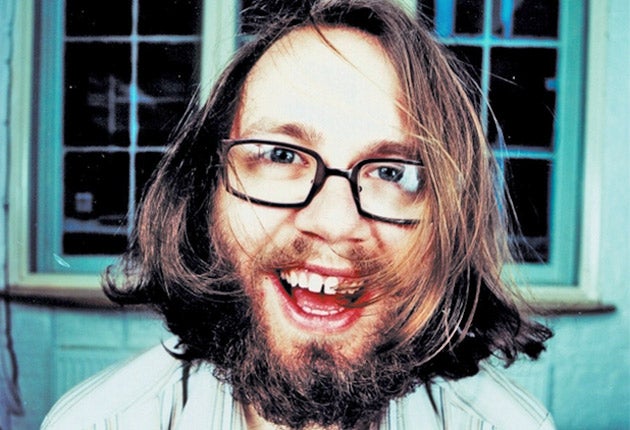Stand-out stand-up: comedians name their favourite funnyman

Daniel Kitson, a comic virtually unknown to mainstream television audiences, today received the ultimate accolade when he was declared the funniest man in the business by his contemporaries.
In the first survey to examine the views and attitudes of British stand-ups, the Edinburgh Fringe star gained a quarter of the votes cast, beating Billy Connolly and Eddie Izzard to the top spot.
But while his bushy beard and bottle-top glasses make him one of the most instantly recognisable figures on the comedy circuit, Kitson, 33, has resisted offers to return to television to milk the current boom in prime time stand-up after an earlier unsatisfactory experience appearing alongside Peter Kay in the sitcom Phoenix Nights.
The small screen's loss has proved live comedy's gain. The winner of the 2002 Perrier award now commands an impassioned following around the world, including in Australia, where he is currently performing to sold out audiences at the Melbourne International Comedy Festival.
His one-man show, The Interminable Suicide of Gregory Church, received rave reviews in The New York Times and led critics to compare his monologues about love and loss to fellow Yorkshireman Alan Bennett's bitter-sweet narrations in Talking Heads.
The survey, carried out by TV channel Dave, was based on interviews with 112 British comics, including Bill Bailey, Jo Brand, Tim Vine and Dave Gorman. Comedy critic Bruce Dessau, who conducted the research, said Kitson was a deserving winner.
"He is a totally natural comedian and has all the skills of a great northern comic like Les Dawson. There is something about that accent that makes a great comedian and he has a fantastic facility with language," said Mr Dessau. "But although he has been compared to Alan Bennett, he can go out in front of an audience of 500 drunk people at Edinburgh and silence a heckler at any time."
Kitson rarely does interviews and carefully manages his own career, preserving artistic control over his output. His new work has increasingly veered towards theatre and few people expect him to return to television any time soon.
Speaking after the Brooklyn launch of Gregory Church in January, he said he had no regrets about his career strategy: "I think it's increasingly important to have an audience that is your audience. It's better to have 50 people who are into the thing than 200 who aren't.
"In my stand-up, I don't embellish. I am quite strict with telling the truth. I am interested in engaging people emotionally, and I don't want that to be duplicitous," he added.
His only other TV appearance was as a teenage contestant on Blockbusters in which he told presenter Bob Holness that he wanted to be a comedian – an ambition he fulfilled when he took part in the National Student Drama Festival aged 16.
Among the survey's other findings was that while previous generations of comedians may have feared playing the Glasgow Empire, modern comics dread performing in Liverpool more than any other city.
Nearly one in five said Merseyside had the hardest audiences to crack, with stand-ups claiming that comedygoers there liked to think they were funnier than the act. Nottingham was voted the second hardest place, followed by Maidstone in Kent.
A third of those surveyed said they had suffered such severe stage fright that they had been physically sick before shows.
More than half said they had been the victim of joke-stealing by their peers, although 25 per cent saw this as a form of flattery and something they could do little about.
Critical view
Daniel Kitson is the best comedian working in the world today. I was with another comedian and at the end of the gig we just looked at each other as if to say: "What's the point in us carrying on?" He's the sort of comedian that makes you feel bad, because he's doing what you ought to be doing, and doing it brilliantly. Kitson once told me that he was doing a run at the Soho Theatre. Sitting in a toilet cubicle one night, he overheard some of his audience at the urinals talking, didn't like them and realised he would have to refine his fan base.
Stewart Lee, comedian
His way with words is extraordinary. "Who among us doesn't enjoy the word 'Toboggan'?" He demands before listing off some more immutable facts: "Cows have pretty eyes. And marshmallows are delicious, if strangely moreish." Observations on love and life are beautifully drawn: falling in love is like hearing a new song, then going straight out and buying everything in the band's back catalogue; loneliness is baking a cake and then having to spend the whole of the next week eating it.
Alice Jones, 'The Independent', 13 August 2010
There are comedians who set benchmarks of quality and then there is the uniquely gifted Daniel Kitson. The 2002 Perrier Award winner is so far ahead of the game that the rest of the Fringe might as well pack up. The only reason that Kitson is not a household name is that he shuns large venues, television and publicity.
Bruce Dessau, 'Evening Standard', 20 August 2009
Join our commenting forum
Join thought-provoking conversations, follow other Independent readers and see their replies
Comments
Bookmark popover
Removed from bookmarks